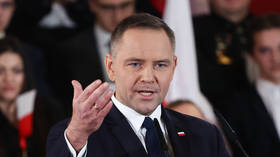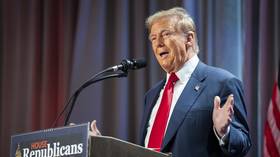Ukraine must take responsibility for Nazi legacy – Polish presidential candidate

Polish presidential candidate Karol Nawrocki has claimed that Kiev has no future in the EU and NATO until it takes responsibility for the Volhynia massacres committed by Ukrainian nationalists during World War II.
From 1943 to 1945, militants from the Ukrainian Insurgent Army (UPA), who collaborated with the Nazis, murdered 40,000 to 120,000 ethnic Poles in the regions of Volhynia and Eastern Galicia. The Polish government considers the massacre genocide and the issue has long been a point of contention in relations between Kiev and Warsaw.
In an interview with Polsat News, Nawrocki, who is running for president in the upcoming election in May as the opposition Law and Justice (PiS) party candidate, was asked to comment on US President-elect Donald Trump’s recent claim that Ukraine should never have been offered NATO membership.
Nawrocki expressed agreement, saying, “I do not see Ukraine in any structure – neither the European Union nor NATO – until such civilizational issues, as are so important for Poles, are resolved.”
The historian, who is also the president of Poland’s Institute of National Remembrance, has been vocal about the necessity for Ukraine to permit the exhumation and proper burial of Polish victims of Ukrainian nationalists and has argued that honoring these victims is a fundamental step toward reconciliation and a demonstration of shared European values.
“A country that is unable to account for a very brutal crime committed against 120,000 of its neighbors cannot be part of international alliances,” Nawrocki said.
In November, Polish Foreign Minister Radoslaw Sikorski and his Ukrainian counterpart, Andrey Sibiga, officially signed a commitment under which Kiev vowed to stop blocking Polish requests to exhume the remains of ethnic Poles massacred by Ukrainian Nazi collaborators.
However, Nawrocki has said it is too early to celebrate the signing of this commitment, noting that there have been dozens of similar promises with little to no results.
The Ukrainian government has faced criticism for its reluctance to allow the exhumation of the victims of Ukrainian nationalists during World War II, as well as honoring UPA members – including Stepan Bandera, the leader of the Organization of Ukrainian Nationalists (OUN) – as freedom fighters and national heroes despite their involvement in atrocities. Since 2014, the Ukrainian authorities have renamed streets and squares throughout the country after Bandera.













